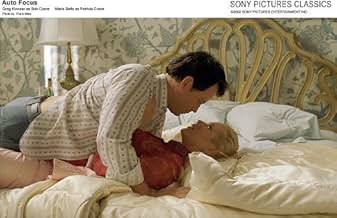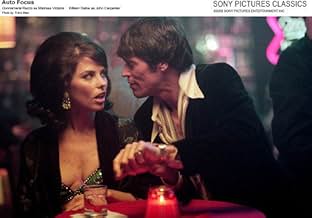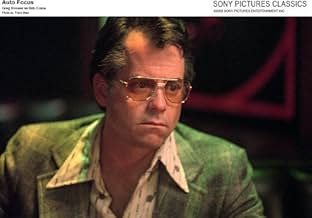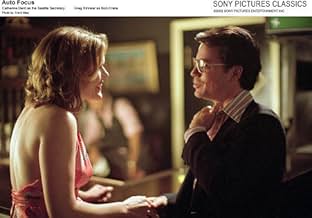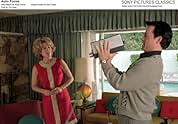The life of TV star Bob Crane and his strange friendship with electronics expert John Henry Carpenter.The life of TV star Bob Crane and his strange friendship with electronics expert John Henry Carpenter.The life of TV star Bob Crane and his strange friendship with electronics expert John Henry Carpenter.
- Awards
- 6 nominations total
Michael E. Rodgers
- Richard Dawson
- (as Michael Rodgers)
DonnaMarie Recco
- Melissa
- (as Donnamarie Recco)
- …
- Director
- Writers
- All cast & crew
- Production, box office & more at IMDbPro
Featured reviews
This is a movie about a man's downfall; in this case, sex. I saw this right after 'Requiem for a Dream'(I guess I was in an addictive mood). This is a sad movie, but not on par with 'Requiem'. I never knew the sordid details about 'Col. Hogan', but this movie laid it out for me. The acting is very good. As other's viewers have noticed, the cinematography and music matches the decline of Crane's life. I was very depressed near the end. There is an obvious implication of his friend Carpenter in his murder, and outside of a court of law, many people would believe it. It's like a weak Oliver Stone/JFK, but still believable. Kind of like a required homework assignment that they may never get credit for, yet execute at 100 percent and show their merit. It wasn't a box office movie, but I believe it's worth watching, and it is exemplarary work by the actors. Maybe it needed more supporting character development, maybe longer screen shots.
Let's face it: Bob Crane was a lightweight actor, whose one-note portrayal of Col. Hogan in the unlikeliest sitcom hit of the 60s made him a household name. Personally, I never understood the appeal of either "Hogan's Heroes" or its star.
Greg Kinnear taps into Bob Crane, though, from the first frame.
The viewer learns that the pre-Hogan Crane was an affable, lovable kind of guy whose LA radio show had a big following. His agent sees him as a combination of Jack Lemmon and Jack Benny, a potential star of fluffy sex comedies with a benign sort of sex appeal and a knack for snappy one-liners All of that was a vast overestimation of Crane's talents.
Crane reveled in the fame that "Hogan" brought him, but he seems never to have taken a long view of his career. When the show ended he was left rudderless and idle, having slowly cut the ties that bound him to ordinary life -- his work, a stable home life, and his religious faith.
While he coasted, Crane took advantage of the easy, cynical charm he conveyed on screen to lure women. By the dozen. I think he probably enjoyed being the least likely man in Hollywood to skulk strip clubs looking for prey, and to devote thousands of yards of videotape to his exploits with them. But his naivete is telling: Crane allows himself to be led into a netherworld by John Carpenter, (Willem Dafoe), who teaches him that putting sex on film is more fun than having it. And there is a brief scene where Crane meets a dominatrix and reveals himself as not quite savvy enough to play this game to win.
Addictions tend to claim those who are on the way up or the way down. Even before Peg Entwistle famously jumped off the Hollywoodland sign in 1922, there have been scores of aspirants to fame or has-beens whose compulsions have killed them, leaving their work on screen the least compelling,least-remembered part of their lives.
Greg Kinnear taps into Bob Crane, though, from the first frame.
The viewer learns that the pre-Hogan Crane was an affable, lovable kind of guy whose LA radio show had a big following. His agent sees him as a combination of Jack Lemmon and Jack Benny, a potential star of fluffy sex comedies with a benign sort of sex appeal and a knack for snappy one-liners All of that was a vast overestimation of Crane's talents.
Crane reveled in the fame that "Hogan" brought him, but he seems never to have taken a long view of his career. When the show ended he was left rudderless and idle, having slowly cut the ties that bound him to ordinary life -- his work, a stable home life, and his religious faith.
While he coasted, Crane took advantage of the easy, cynical charm he conveyed on screen to lure women. By the dozen. I think he probably enjoyed being the least likely man in Hollywood to skulk strip clubs looking for prey, and to devote thousands of yards of videotape to his exploits with them. But his naivete is telling: Crane allows himself to be led into a netherworld by John Carpenter, (Willem Dafoe), who teaches him that putting sex on film is more fun than having it. And there is a brief scene where Crane meets a dominatrix and reveals himself as not quite savvy enough to play this game to win.
Addictions tend to claim those who are on the way up or the way down. Even before Peg Entwistle famously jumped off the Hollywoodland sign in 1922, there have been scores of aspirants to fame or has-beens whose compulsions have killed them, leaving their work on screen the least compelling,least-remembered part of their lives.
Not having had a chance to see the movie first-run, I bought the DVD and was impressed with it. The movie itself was, to borrow a phrase from another review on this site "brilliantly disturbing." Those of us who remember when Bob Crane was murdered at an apartment in Scottsdale, AZ while doing dinner theater gig; that was weird in of itself. After all who would want to kill good old Colonel Hogan? I remember watching Crane on the show, and also on talk or game shows. He seemed so together, self-assured and quick-witted. So it was even more of a shock to find out about his double-life, which this movie covers so well although it is perhaps a bit misleading in spots.
Greg Kinnear does very good as Crane, especially in the latter scenes of the film. I think the part of Bob Crane would be somewhat difficult to play. Crane's legendary status is caught up not in his career itself, but his life other "on camera" life. A life that ended with his bludgeoning death (by blows from a camera tripod.) in June, 1978, just two weeks before what would have been his 50th birthday. Wilhem Dafoe is even better as the creepy John "Carpie" Carpenter, a video salesman who Crane meets on the set of Hogan's Heroes. Virtually all the supporting cast is also quite good. Particularly good are Kurt Fuller as Werner Klemperer/Col. Klink and Rob Leibman, who plays Crane's agent who watches helplessly as Crane's career and personal life veer out of control and plummet.
Carpenter, an electronics expert, at the time worked for Sony, selling the new and expensive technology of videotape players to mostly celebrities or others wealthy enough to afford them. The movie takes the viewer through the mid-late 1960's as Crane and Carpenter, both sex addicts, videotape their seemingly every night exploits with women they pick up from night clubs. This is no problem for Crane who was handsome and famous. Carpenter was portrayed as a hanger-on, along for the ride, and taking Crane's "seconds." Crane, married with children is at first able to hide his double-life from his family, although his wife is suspicious of his roving eye.. As a sidebar, there are some interesting tidbits in the movie about the development of videotape in the 60's into the 70's. After the cancellation of Hogan's Heroes in 1971 and his expensive divorce (his wife found photographic evidence of his escapades), Crane's sex addition seemingly worsens. He remarries, this time to an actress who played Col Klink's secretary in the Hogan's Heroes who tells him his dalliances are okay with her. They have a son soon after they are married and even she grows weary of his being away so much with Carpenter.
The mood of the film is in the beginning almost light-hearted, almost campy at times. . As the film continues and as Crane's personal life steadily implodes, professional life goes on the decline, a sense of darkness and desperation engulf the film. This is reinforced superbly by the hues on screen and the background music. The symbiotic relationship between Crane and Carpenter are portrayed so convincingly. Crane needed Carpenter for his video expertise and Carpenter needed Crane for the access to women. It is stunning how cavalier Crane was about picking up women and taping his sex acts, with or without their consent.
Crane is portrayed as a nearly broke totally washed-up B or C grade celebrity at the time of his murder. This was not necessarily the case. Crane in fact had made a lot of guest appearances on television series and game shows in the early and mid-70's. He had been signed to star in an ABC Movie of the Week shortly before his murder. Crane also owned a portion of Hogan's Heroes, and had received a royalty check in 1977 of over $95,000. Doing dinner theater was more a choice he had made, and he was making amounts off dinner theater that rivaled his royalty checks. Not a fortune, but a very decent living, especially for that time. To be sure he was strained by having to support one but two families, plus his addiction. He was not the big star he was, but not in oblivion, either. Only so much can be covered in the film's 90 or so minute running time, but the notion that his professional life was in smithereens was a bit misleading. Yet, many in Hollywood knew about his exploits and it no doubt cost him in professional opportunities. There is debate on both sides whether or not Crane at the time of his murder was attempting to change his life.
Near the end it is clear Crane had grown tired of "Carpie" and had basically told him the friendship as they knew it was coming to an end. This was just a day or so before his murder. Carpenter was arrested and tried years later for the murder but acquitted. He died in 1998, and the case officially remains unsolved.
Paul Schrader (Taxi Driver) directs so well this lurid and unflinching story. The DVD has lots of extras, including 3 different commentaries. The first by Kinnear and Dafoe, is good. Schrader's commentary is best as it offers a lot of insight into how they were able to make a relatively low-budget picture ($7 million I recall) look like they easily spent twice that amount. There is a third commentary was by the screenplay writers that I found dull. The deleted scenes are worth watching. For those interested in the Crane murder and the "whodunit" aspect there is a 45 minute feature entitled "Murder in Scottsdale" loaded with interviews and archival footage. The movie is based on Robert Graysmith's The Murder of Bob Crane, which I found to be interesting reading.
Greg Kinnear does very good as Crane, especially in the latter scenes of the film. I think the part of Bob Crane would be somewhat difficult to play. Crane's legendary status is caught up not in his career itself, but his life other "on camera" life. A life that ended with his bludgeoning death (by blows from a camera tripod.) in June, 1978, just two weeks before what would have been his 50th birthday. Wilhem Dafoe is even better as the creepy John "Carpie" Carpenter, a video salesman who Crane meets on the set of Hogan's Heroes. Virtually all the supporting cast is also quite good. Particularly good are Kurt Fuller as Werner Klemperer/Col. Klink and Rob Leibman, who plays Crane's agent who watches helplessly as Crane's career and personal life veer out of control and plummet.
Carpenter, an electronics expert, at the time worked for Sony, selling the new and expensive technology of videotape players to mostly celebrities or others wealthy enough to afford them. The movie takes the viewer through the mid-late 1960's as Crane and Carpenter, both sex addicts, videotape their seemingly every night exploits with women they pick up from night clubs. This is no problem for Crane who was handsome and famous. Carpenter was portrayed as a hanger-on, along for the ride, and taking Crane's "seconds." Crane, married with children is at first able to hide his double-life from his family, although his wife is suspicious of his roving eye.. As a sidebar, there are some interesting tidbits in the movie about the development of videotape in the 60's into the 70's. After the cancellation of Hogan's Heroes in 1971 and his expensive divorce (his wife found photographic evidence of his escapades), Crane's sex addition seemingly worsens. He remarries, this time to an actress who played Col Klink's secretary in the Hogan's Heroes who tells him his dalliances are okay with her. They have a son soon after they are married and even she grows weary of his being away so much with Carpenter.
The mood of the film is in the beginning almost light-hearted, almost campy at times. . As the film continues and as Crane's personal life steadily implodes, professional life goes on the decline, a sense of darkness and desperation engulf the film. This is reinforced superbly by the hues on screen and the background music. The symbiotic relationship between Crane and Carpenter are portrayed so convincingly. Crane needed Carpenter for his video expertise and Carpenter needed Crane for the access to women. It is stunning how cavalier Crane was about picking up women and taping his sex acts, with or without their consent.
Crane is portrayed as a nearly broke totally washed-up B or C grade celebrity at the time of his murder. This was not necessarily the case. Crane in fact had made a lot of guest appearances on television series and game shows in the early and mid-70's. He had been signed to star in an ABC Movie of the Week shortly before his murder. Crane also owned a portion of Hogan's Heroes, and had received a royalty check in 1977 of over $95,000. Doing dinner theater was more a choice he had made, and he was making amounts off dinner theater that rivaled his royalty checks. Not a fortune, but a very decent living, especially for that time. To be sure he was strained by having to support one but two families, plus his addiction. He was not the big star he was, but not in oblivion, either. Only so much can be covered in the film's 90 or so minute running time, but the notion that his professional life was in smithereens was a bit misleading. Yet, many in Hollywood knew about his exploits and it no doubt cost him in professional opportunities. There is debate on both sides whether or not Crane at the time of his murder was attempting to change his life.
Near the end it is clear Crane had grown tired of "Carpie" and had basically told him the friendship as they knew it was coming to an end. This was just a day or so before his murder. Carpenter was arrested and tried years later for the murder but acquitted. He died in 1998, and the case officially remains unsolved.
Paul Schrader (Taxi Driver) directs so well this lurid and unflinching story. The DVD has lots of extras, including 3 different commentaries. The first by Kinnear and Dafoe, is good. Schrader's commentary is best as it offers a lot of insight into how they were able to make a relatively low-budget picture ($7 million I recall) look like they easily spent twice that amount. There is a third commentary was by the screenplay writers that I found dull. The deleted scenes are worth watching. For those interested in the Crane murder and the "whodunit" aspect there is a 45 minute feature entitled "Murder in Scottsdale" loaded with interviews and archival footage. The movie is based on Robert Graysmith's The Murder of Bob Crane, which I found to be interesting reading.
As anyone who is reading this knows, this was the story of TV's Bob Crane, star of "Hogan's Heroes," a popular show in the 1960s. The story of Crane, the one that makes him a subject of a major motion picture of his life, are two things: 1 - the good-guy TV hero was, behind the scenes, a huge sex addict; 2 - he was murdered, with no one ever convicted of the crime. To this day, it is still unsolved.
The movie hints very strongly that the killer was Bob Carpenter, played here by Willem Dafoe. Carpenter was a close friend of Crane's. Greg Kinnear does a credible job of portraying the television star.
However, the part about Crane's murder is only dealt with in the final minutes of the film! That was very disappointing and I was hoping to find out something or at least be given more information. They just kind tacked this on the end of the film.
Most of the film was about Crane's and Carpenter's escapades with women.....lots of women, beautiful and big-chested women, which you see in abundance in this film. Dafoe is the sleazy friend who introduces Crane to the beginning of the VCR age. That led to a whole bunch of sex-on-film and really whetted Crane's big sexual appetite.
Anyway, for people who watched "Hogan's Heroes," and there were plenty, this is a bio of him and perhaps, for those who know nothing about his death, who killed him.
The movie hints very strongly that the killer was Bob Carpenter, played here by Willem Dafoe. Carpenter was a close friend of Crane's. Greg Kinnear does a credible job of portraying the television star.
However, the part about Crane's murder is only dealt with in the final minutes of the film! That was very disappointing and I was hoping to find out something or at least be given more information. They just kind tacked this on the end of the film.
Most of the film was about Crane's and Carpenter's escapades with women.....lots of women, beautiful and big-chested women, which you see in abundance in this film. Dafoe is the sleazy friend who introduces Crane to the beginning of the VCR age. That led to a whole bunch of sex-on-film and really whetted Crane's big sexual appetite.
Anyway, for people who watched "Hogan's Heroes," and there were plenty, this is a bio of him and perhaps, for those who know nothing about his death, who killed him.
Bob Crane's life is the subject of Auto Focus from 2002.
A popular star of the hit series Hogan's Heroes, Crane was a sex addict who enjoyed videotaping his sexual encounters. His partner in this endeavor was video expert John Carpenter.
Crane was murdered while doing dinner theater in Arizona. John Carpenter was a suspect in the murder, as were others. Carpenter was ultimately brought to trial and acquitted. The crime scene had been sloppily handled, and by the time Carpenter was arrested years later, evidence was missing. Carpenter died four years after his trial. The film's point of view suggests he was indeed the killer.
Crane had told his son that Carpenter was a hanger-on and he was getting ready to dump him, which police felt was a good motive for anger leading to murder.
Paul Schrader does a good job of directing, and the performances are solid from Greg Kinnear and Willem Dafoe especially. I do have to say that Kurt Fuller, a favorite of mine, was absolutely fantastic as Werner Klemperer in his role of Colonel Klink - one would have thought he was Werner - the look, the accent, the mannerisms - perfect.
Schrader shows Crane's decline, using both music and atmosphere to create what became the empty life of a man looking for something that he could never find. The DVD has a documentary about the murder on it, and his daughter states when interviewed that Crane was a wonderful father, "very doting." A sad story of the double life of someone who lit up the TV screen in the '60s.
A popular star of the hit series Hogan's Heroes, Crane was a sex addict who enjoyed videotaping his sexual encounters. His partner in this endeavor was video expert John Carpenter.
Crane was murdered while doing dinner theater in Arizona. John Carpenter was a suspect in the murder, as were others. Carpenter was ultimately brought to trial and acquitted. The crime scene had been sloppily handled, and by the time Carpenter was arrested years later, evidence was missing. Carpenter died four years after his trial. The film's point of view suggests he was indeed the killer.
Crane had told his son that Carpenter was a hanger-on and he was getting ready to dump him, which police felt was a good motive for anger leading to murder.
Paul Schrader does a good job of directing, and the performances are solid from Greg Kinnear and Willem Dafoe especially. I do have to say that Kurt Fuller, a favorite of mine, was absolutely fantastic as Werner Klemperer in his role of Colonel Klink - one would have thought he was Werner - the look, the accent, the mannerisms - perfect.
Schrader shows Crane's decline, using both music and atmosphere to create what became the empty life of a man looking for something that he could never find. The DVD has a documentary about the murder on it, and his daughter states when interviewed that Crane was a wonderful father, "very doting." A sad story of the double life of someone who lit up the TV screen in the '60s.
Did you know
- TriviaThe leather jacket that Greg Kinnear wears while playing Bob Crane in the Papa Schultz (1965) scenes of this movie is the one that the real Crane actually wore during the filming of that TV series. Crane's son Robert David Crane loaned the jacket to Kinnear for this movie. Prior to the original "Hogan's Heroes" show, Frank Sinatra wore this exact same jacket in L'express du colonel von Ryan (1965).
- GoofsThere is a glimpse of the famous Capitol Records building painted silver. At the time of the film, it was actually painted black to resemble a stack of records.
- Quotes
Bob Crane: I think it's perfect for me. I mean, this character Hogan, he's quick on his toes, he's hip, he's a con artist. I don't wanna jinx it, but I think it's what I've been working toward my whole career!
Anne Crane: Really? You've been working towards a Holocaust comedy?
Bob Crane: Ann!
Anne Crane: What, Bob?
Bob Crane: Please, not in front of the children! They look up to me!
Anne Crane: They're small. They look up to everyone.
- Alternate versionsThe following deleted scenes appear on the DVD:
- Victoria finds Bob's body.
- Hogan's Heroes Montage
- Bob unloads drums and some dirty magazines fall out.
- Anne and Bob talking by the pool.
- Anne in the darkroom.
- ConnectionsFeatured in Auto Focus: Featurette (2002)
- SoundtracksSnap!
Written by Paul Schrader and Angelo Badalamenti
Performed by David Johansen (as Buster Poindexter)
Produced by Brian Koonin
- How long is Auto Focus?Powered by Alexa
Details
Box office
- Budget
- $7,000,000 (estimated)
- Gross US & Canada
- $2,063,196
- Opening weekend US & Canada
- $123,761
- Oct 20, 2002
- Gross worldwide
- $2,704,951
- Runtime
- 1h 45m(105 min)
- Color
- Sound mix
- Aspect ratio
- 1.85 : 1
Contribute to this page
Suggest an edit or add missing content







